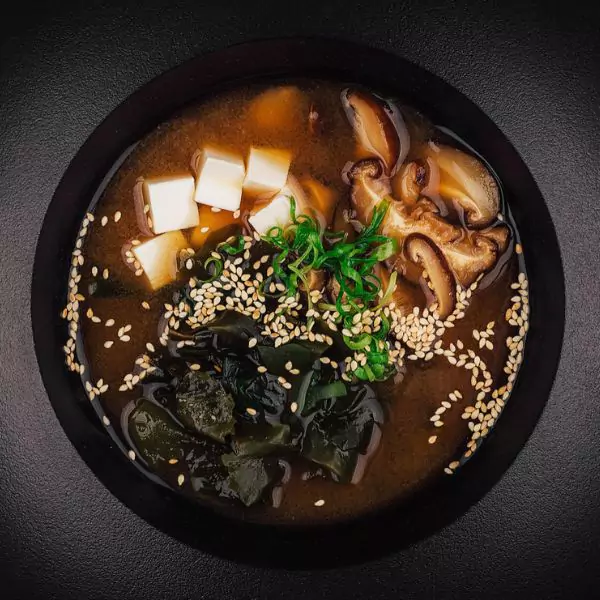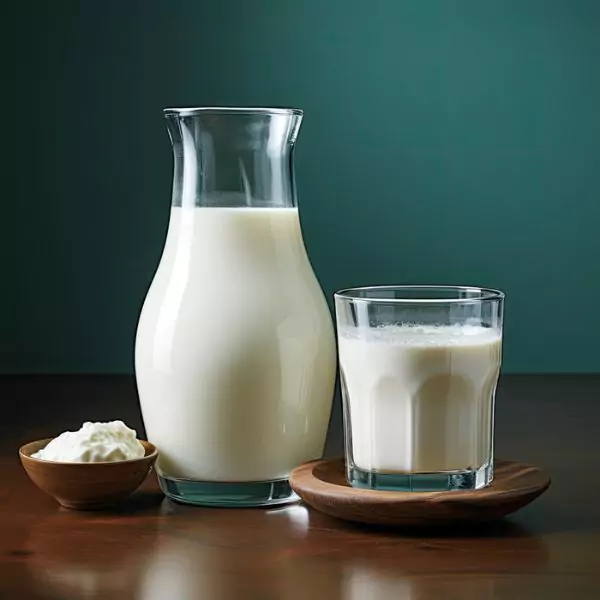Maintaining a healthy gut is essential for overall well-being, influencing everything from digestion and metabolism to immunity and even mental health through the gut-brain axis. When your gut health is compromised, it can lead to uncomfortable symptoms such as bloating, gas, weight gain, and even chronic health issues. A well-balanced gut microbiome not only aids in digestion but also plays a role in reducing visceral fat, which is the harmful fat stored around internal organs.
Visceral fat is associated with various metabolic conditions, including insulin resistance, heart disease, and type 2 diabetes. One of the most effective ways to support gut health and manage visceral fat is through your diet. Certain fermented and probiotic-rich foods can help balance gut bacteria, improve digestion, and promote fat loss. We consulted nutrition experts Sarah Anderson, NP, Lisa Richards, and Samantha Cassetty, MS, RD, to learn about four gut-healthy foods they recommend for better digestion and visceral fat loss: kimchi, miso, kefir, and kombucha.
1. Kimchi: A Spicy, Probiotic-Rich Powerhouse

Kimchi, a traditional Korean dish made from fermented vegetables like Napa cabbage and radishes, has gained global attention not only for its bold flavors but also for its numerous health benefits. The fermentation process involved in making kimchi produces probiotics, the beneficial bacteria that support a healthy gut microbiome. Probiotics help restore balance to the gut, improving digestion, nutrient absorption, and overall metabolic health.
Why Kimchi is Great for Gut Health Sarah Anderson explains that “the fermentation process requires many good bacteria, and they are retained in the food once the process has ended.” These probiotics are particularly beneficial for digestion, as they enhance the gut’s ability to break down food and absorb nutrients efficiently. A well-functioning gut can reduce issues such as bloating and constipation, while also boosting metabolism.
In addition to probiotics, kimchi is high in fiber, which supports healthy digestion and promotes a feeling of fullness. Fiber-rich foods like kimchi are also linked to lower visceral fat accumulation because they help regulate blood sugar levels and reduce overeating. Kimchi’s combination of fiber and probiotics makes it an excellent addition to a weight-loss plan focused on visceral fat reduction.
How to Incorporate Kimchi into Your Diet Kimchi is a versatile food that can be eaten on its own as a side dish, added to rice bowls, or used as a flavorful topping for salads and tacos. Its spicy, tangy flavor pairs well with many dishes, making it easy to incorporate into your daily meals.
2. Miso: A Traditional Japanese Superfood

Miso, a fermented soybean paste from Japan, is another gut-healthy food packed with probiotics and nutrients that support digestion and weight loss. Made from soybeans fermented with a mold called Aspergillus oryzae, miso is rich in live enzymes that help break down food in the digestive system, making nutrient absorption more efficient. This process can ease the burden on the digestive system, reducing bloating and discomfort while promoting gut health.
Why Miso is Beneficial for Digestion and Weight Loss Lisa Richards highlights miso’s role in supporting gut health: “Miso is rich in live enzymes that aid in breaking down food, easing the burden on the digestive system. Moreover, miso contains prebiotics, which are non-digestible fibers that nourish beneficial gut bacteria.” These prebiotics serve as food for the probiotics in your gut, helping to maintain a balanced microbiome.
Miso also contains metabolic-boosting compounds that may aid in weight management and visceral fat loss. By improving digestion and promoting a healthy gut environment, miso can enhance metabolic processes and help the body burn fat more effectively.
How to Incorporate Miso into Your Diet Miso is most commonly used to make miso soup, which is a gentle and easily digestible option for those with sensitive stomachs. You can also use miso as a marinade for meats, fish, or tofu, or add it to salad dressings and sauces to boost both flavor and gut health.
3. Kefir: A Probiotic-Rich Dairy Drink

Kefir, a fermented dairy product similar to yogurt but with a thinner consistency, is another gut-friendly food praised for its high probiotic content. Kefir is made by fermenting milk with kefir grains, which contain a variety of beneficial bacteria and yeast that help balance the gut microbiome. A healthy gut microbiome is crucial for proper digestion, nutrient absorption, and overall digestive health.
Why Kefir is Good for Gut Health and Visceral Fat Loss Samantha Cassetty emphasizes that kefir contains “millions of good bacteria to improve digestion by balancing out the microflora in the gut.” A balanced gut microbiome is essential for reducing inflammation, supporting digestion, and improving overall gut health.
Kefir is also high in protein and healthy fats, which contribute to feelings of fullness and help regulate appetite. By keeping you satisfied for longer periods, kefir can help reduce overall calorie intake, which is key for weight management and fat loss. Additionally, the probiotics found in kefir can help reduce inflammation and improve insulin sensitivity, both of which are linked to lower visceral fat levels.
Cassetty also points out that “one study found that eating six servings of fermented foods per day, like kefir, led to better microbiome diversity and reduced markers of inflammation.” This reduction in inflammation is associated with a lower risk of various metabolic conditions, including type 2 diabetes and heart disease.
How to Incorporate Kefir into Your Diet Kefir can be enjoyed on its own as a refreshing drink, or blended into smoothies for an easy, gut-healthy breakfast. You can also use kefir as a base for salad dressings, add it to oatmeal, or mix it with fruits and nuts for a nutritious snack. For those who are lactose intolerant, water kefir made from sugar water or coconut water offers similar probiotic benefits without the dairy.
4. Kombucha: The Fermented Tea with Gut-Boosting Benefits

Kombucha, a popular fermented tea, is another excellent option for promoting gut health and aiding in visceral fat loss. Kombucha is made by fermenting tea with a symbiotic culture of bacteria and yeast (often referred to as a SCOBY). This fermentation process creates a beverage rich in probiotics, organic acids, and antioxidants, all of which support digestive health and overall well-being.
Why Kombucha is Great for Gut Health and Fat Loss Kombucha’s probiotic content helps balance the gut microbiome, which in turn improves digestion and nutrient absorption. As Samantha Cassetty explains, kombucha “contains organic acids and enzymes that support the digestive system.” These compounds aid in breaking down food more efficiently and promote a healthy gut environment.
In addition to its probiotic benefits, kombucha contains acetic acid, which some studies suggest may help reduce fat storage and increase fat burning. Kombucha also provides polyphenol antioxidants, which have anti-inflammatory properties and help protect cells from oxidative stress. By reducing inflammation and improving digestion, kombucha can indirectly support visceral fat loss and improve overall metabolic health.
How to Incorporate Kombucha into Your Diet Kombucha can be enjoyed as a refreshing, fizzy drink on its own or mixed with fruit juice for added flavor. It is widely available in stores and comes in various flavors, but you can also brew your own kombucha at home. Just be mindful of the sugar content in store-bought varieties—choose low-sugar options to avoid consuming excess calories.
Incorporating Gut-Healthy Foods for Better Digestion and Fat Loss
A healthy gut is key to better digestion, metabolic efficiency, and visceral fat reduction. Foods rich in probiotics and prebiotics, such as kimchi, miso, kefir, and kombucha, offer essential support for maintaining a balanced gut microbiome. By promoting the growth of beneficial bacteria, these foods help improve digestion, reduce inflammation, and aid in weight management.
Incorporating these gut-friendly foods into your daily diet can lead to improved digestion, better nutrient absorption, and lower levels of visceral fat, all of which contribute to overall health. Whether you enjoy kimchi with your meals, sip on kombucha, or start your day with a kefir smoothie, these foods can make a big difference in your gut health and your journey toward achieving a healthy weight.
For best results, pair these gut-healthy foods with a balanced diet rich in whole grains, vegetables, and lean proteins to optimize your digestion and support long-term health.



